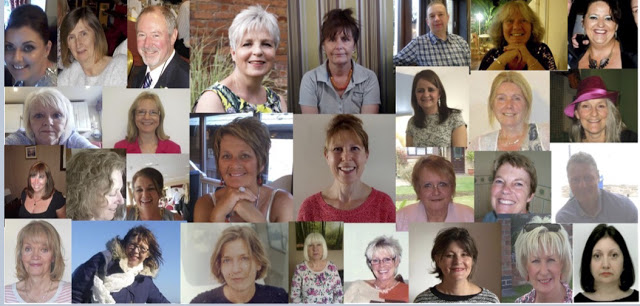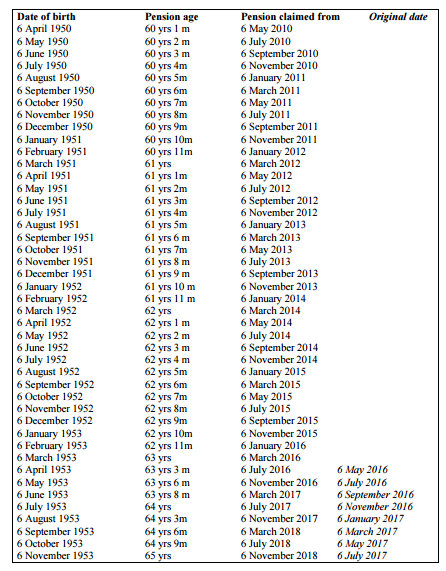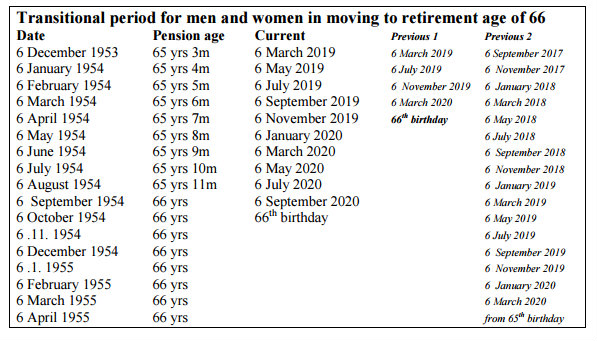Back in 1995, the UK government made what was widely regarded at the time as a sensible and long-overdue change to state pension legislation. Since World War II, women had retired five years earlier than men, a sop to compensate them for their inability to clock up pensions of the same size as their spouses - and incidentally to enable men and women to retire at approximately the same time, since it was assumed that most men were older than their wives. But by the mid-1990s far more women were working, married women's income was taxed separately from their husbands', many were paying NICs large enough to qualify for pensions the size of men's, and - most importantly of all - they were outliving men. Many people, both men and women, believed that the earlier retirement of women was an anomaly which desperately needed eradicating. I was one of those people: when the Pensions Act 1995 raised women's retirement age to 65, I was pleased - even though it meant that I personally would have to work for five more years.The timetable for raising the retirement age was extraordinarily generous. The change would be phased in between 2010 and 2020. Women born before April 1950 would retire at 60, but women born between April 1950 and March 1955 would retire at some age between 60 and 65, the retirement age gradually rising until 2020.
Topics:
Frances Coppola considers the following as important: pensions
This could be interesting, too:
Nick Falvo writes Homelessness among older persons
Frances Coppola writes We need to talk about the state pension
Frances Coppola writes Statistics for state pension age campaigners
Frances Coppola writes Statistics for state pension age campaigners
Back in 1995, the UK government made what was widely regarded at the time as a sensible and long-overdue change to state pension legislation. Since World War II, women had retired five years earlier than men, a sop to compensate them for their inability to clock up pensions of the same size as their spouses - and incidentally to enable men and women to retire at approximately the same time, since it was assumed that most men were older than their wives. But by the mid-1990s far more women were working, married women's income was taxed separately from their husbands', many were paying NICs large enough to qualify for pensions the size of men's, and - most importantly of all - they were outliving men. Many people, both men and women, believed that the earlier retirement of women was an anomaly which desperately needed eradicating. I was one of those people: when the Pensions Act 1995 raised women's retirement age to 65, I was pleased - even though it meant that I personally would have to work for five more years.
The timetable for raising the retirement age was extraordinarily generous. The change would be phased in between 2010 and 2020. Women born before April 1950 would retire at 60, but women born between April 1950 and March 1955 would retire at some age between 60 and 65, the retirement age gradually rising until 2020. The first cohort to retire on their 65th birthday would be born in April 1955.
In 2010, the Government announced an intention to raise the retirement age for men and women from 65 to between 66 and 68 depending on their current age. Women born from April 1953 onwards therefore suffered a further rise in their retirement age. Older women were at this point unaffected. But that did not mean they would retire at 60. The majority of those born between April 1950 and March 1953 were already scheduled to retire later than 60 under the existing transitional arrangements.
But in 2011, that changed. The government, under pressure from the EU, decided to shorten the transition to harmonised retirement ages for men and women. The first cohort to retire at the harmonised age would do so in 2018, not 2020, and their retirement age would be 66 not 65. This steepened the transition for all women born from 1951 onwards.
Robert Leach has some handy charts showing how both the original transition schedule and the 2011 change affected the various age cohorts. As can be seen from this chart, the original schedule affected ALL women born after April 1950. Only those born before April 1950 would retire on their 60th birthday, and women born after February 1951 would not retire at 60 at all:
The fact that the original 1995 transition schedule meant that the vast majority of women born after 1950 would retire later than 60 seems to have been lost on many of them. Even women born as late as 1959 seem to have expected to retire at 60. I will return to this shortly.
The 2011 change had no effect on women born before April 1953. But as the chart shows, women born from April -November 1953 suffered sharp increases in their retirement ages. A woman born in November 1953 will now be two whole years older when she retires than a woman born in March of the same year. It is easy to see why she might regard this as unfair.
These are the original WASPI women - those born in 1953-4 who suffer an increase of up to 18 months in their retirement age as a result of the 2011 change. Their retirement ages have been extended by a total of between 3 and 5 years, mostly due to a transition schedule that was established in 1995.
However, women born in 1953-4 were also affected by the 2007 rise to 66 (68) for both men and women. Robert Leach's chart shows how:
This chart requires a little explanation. "Previous 2" is the date that a woman would have retired under the transition to the harmonised retirement age had there been no additional increase. "Previous 1" is the date that she would have retired had the Coalition government gone ahead with the increase as originally proposed in 2007. But in 2011, the Coalition government softened this transition. This was largely due to the effect on women born in 1953-4, some of whom would suffer a two-year increase in their retirement age because of the combination of this change with the tightened harmonisation schedule described above. The Government agreed with campaigners that no-one should suffer an increase of more than 18 months on top of the original harmonisation schedule. The transitional schedule for the 2007 increase was therefore amended to that shown in the "current" column.However, despite this softening, many women born between 1954 and 1959 are furious. When they started work, they believed they would retire at 60. Now, most of them have to work until they are 66. Women born between 1951 and 1953 are also angry, even though they have not suffered such a steep increase in their retirement ages as their younger sisters. They have seen women only slightly older than them retire at 60, while they have to wait for up to another 5 years.
Many of these women say they did not know about the extension of their retirement ages until recently. The WASPI campaign claims that women have been given so little notice of the changes that they had no time to prepare. It is raising a petition to Parliament calling for "fair transitional arrangements" for women born from April 1951 onwards.
It is fair to say that the DWP's communication has been abysmal. The original 1995 change was not communicated at all: it was reported in the media at the time, but no attempt was made to contact the women affected. This is the main change that affects women born in the 1950s, since it adds up to 5 years to their working lives. However, it also affects younger women. In 1995, all women of working age would have expected to retire at 60. All of them have had increases of up to 5 years in their working lives, and none of them were contacted. It is not clear why WASPI women claim that the lack of notification made the transition unfair to them in particular.
DWP says that it has written to all the women affected, though it admits that it only started to write to them from April 2009 onwards. However, according to the BBC's Paul Lewis, many of the letters may have failed to arrive, apparently due to addresses being out of date as a result of appalling record-keeping by DWP and HMRC. And of course, notifying WASPIs of changes from 2009 onwards was utterly inadequate anyway. Many were already close to 60: since they had not been informed of the 1995 changes, they were expecting to retire shortly. Suddenly they discovered that they were not eligible for a state pension for - in some cases - another 5 or 6 years.
The Government now says that there will be 10 years' notice for future pension age rises. On the basis of this, WASPI women argue that they should receive compensation because they were given far less notice of the extension of their pension age. But if women born in the 1950s can claim compensation because lack of notification means that they have had insufficient time to prepare, so can younger women. After all, a woman born in 1960 - outside the WASPI campaign's target age range - would now be 55. If she is expecting to retire at 60, having never been told otherwise, she faces a 6-year increase in her retirement age with only 5 years notice. In 2004, the DWP themselves produced evidence that younger people were less aware of the harmonisation than older ones (h/t Alan Higham). Given this, why is the WASPI campaign limited to women born in the 1950s?
And there is another mystery here. What on earth have pension providers (employers and private schemes) been telling people?. Annie Shaw tells me of professional women - nurses, teachers, even a head-teacher - who took early retirement in their fifties on final salary pensions, fully expecting to receive their state pension at 60. Some of my Twitter contacts told me that they had taken voluntary redundancy, or allowed their contracts to expire, on the understanding that they would receive a state pension at 60. One of my WASPI contacts told me her private pension provider had given her a pension statement which showed her state retirement age as 60. My own workplace and private pension providers, too (I have several), continue to show my retirement age as 60 even though my state retirement age is now 66 and I have never told them I intend to retire early. Preparing pension statements, or even advising people when they can safely retire from a financial perspective, on the assumption that people's state retirement date is years earlier than it is likely to be in reality is highly misleading. Surely we should expect the pensions industry to behave more responsibly?
Having said all this, though, I do not think these WASPIs are behaving entirely reasonably. The harmonisation of retirement ages for men and women was extensively debated prior to the 1995 Act, and the passing of the Act was widely reported in the media at the time. Many people I have talked to assume that I knew about the changes because I worked in banking. But the pensions industry is completely separate from banking, and working in finance does not imply knowledge of pensions legislation. I actually heard about it on Radio 4's Woman's Hour, which as a young mother in 1995 I used to listen to while my son was asleep. So although I was not notified until this year that my retirement age would be 66, not 60 as it was when I started work, I already knew about the extra 6 years. If I can pay attention to what is reported in the media, surely these professional women who retired in their fifties could do so too?
Additionally, what were these women thinking of, planning their retirements - including giving up their jobs - on the assumption of receiving a state pension at 60? Surely they should have checked their entitlement? DWP says that it has been possible to ask for a statement of entitlement, including pension age, since 2001. Planning retirement without checking looks like folly to me. Though DWP does not exactly make it easy for people: even now, the online entitlement checker couldn't tell me how much I will receive, apparently because the state pension is changing in April 2016, though it was able to tell me my retirement age.
I have some sympathy for less educated women who did not or could not read or listen to the sort of media where the pension changes were reported, and did not know how to check with DWP about their pension entitlement. But I have none at all for professional women who simply did not bother. They should know better.
However, there is a deeper issue. It is not at all clear exactly what the WASPI campaigners want. They say they want some kind of "transitional relief" for women suffering as a consequence of pension age extension, perhaps because they have given up work and now face the indignity of JSA or ESA claims and the hardship of living on benefits that are less generous than the state pension. But in a recent interview on BBC Breakfast, the principal WASPI campaigner, Anne Keen, said his:
This muddies the waters considerably. In effect, Ms Keen wants the equality legislation rolled back so that she and other women born in the 1950s can receive the state pension at 60, which they consider their "right". If it is a "right" for them, why is it not for younger women? And what about the fact that reinstating their "right" would create a "cliff edge" for the next cohort of women? Those born in 1960 could legitimately complain about the unfairness of having to retire SIX YEARS later than women only a few days or weeks older. I must declare an interest here: I would be one of those women. It is hardly surprising that I am less than sympathetic to those WASPIs who simply want their pension entitlement reinstated.We are saying to the government, you have a moral obligation to put those women in the same financial situation that they would have been if they had been born on or before 5 April 1950. It's not a handout: we are asking for what is rightfully ours."
Nor is it helpful to conflate the problems caused by the DWP's failure to communicate the extension of pension ages with the freezing of pensions to expatriates, the uprating of pensions in line with CPI instead of RPI, or the fact that a large proportion of women - especially older ones - will not qualify for full entitlement to the new state pension. All of these are important issues, especially the last, which I consider to be a major scandal in the making. But they are not the same as the WASPI problem.
And last but by no means least, it is absolutely wrong in my view to use the fact that some WASPI women are sick, disabled or in a caring role to justify reinstating retirement at 60. The support currently offered to sick, disabled and carers is a national disgrace and I for one want to see it vastly improved. Allowing WASPIs to use earlier retirement as a means of getting better support will set back even further the cause of older men and younger people in the same situation. And as for the notion that a pension age of 60 is justified to enable WASPIs to care for their grandchildren, I really don't see why the state pension should become a childcare subsidy.
So to conclude, I agree that the DWP has made a total hash of the extension of women's retirement ages, and because of this there probably is a case for some women receiving exceptional assistance to relieve short-term hardship. But this must be considered on a case-by-case basis. However angry the WASPIs are, no way is direct or indirect reinstatement of state pension rights at 60 for women born in the 1950s remotely justified. Ros Altmann, the Pensions Minister, is absolutely right to rule it out. There are far more important injustices to address than this.
_________________________________________________________________________________
Image: WASPI women montage, from Crowdjustice.
It would have been tasteless to put an image of a swarm of wasps at the head of this post. But I couldn't resist adding a link to the Wasps overture by Ralph Vaughan Williams. Enjoy.



